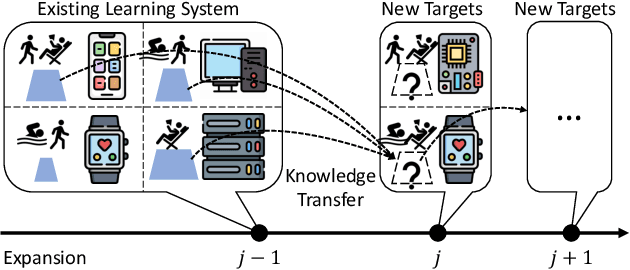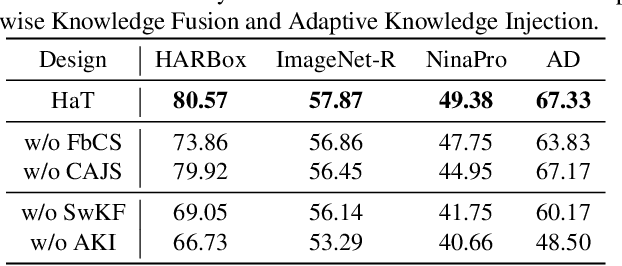Huatao Xu
AutoTour: Automatic Photo Tour Guide with Smartphones and LLMs
Jan 11, 2026Abstract:We present AutoTour, a system that enhances user exploration by automatically generating fine-grained landmark annotations and descriptive narratives for photos captured by users. The key idea of AutoTour is to fuse visual features extracted from photos with nearby geospatial features queried from open matching databases. Unlike existing tour applications that rely on pre-defined content or proprietary datasets, AutoTour leverages open and extensible data sources to provide scalable and context-aware photo-based guidance. To achieve this, we design a training-free pipeline that first extracts and filters relevant geospatial features around the user's GPS location. It then detects major landmarks in user photos through VLM-based feature detection and projects them into the horizontal spatial plane. A geometric matching algorithm aligns photo features with corresponding geospatial entities based on their estimated distance and direction. The matched features are subsequently grounded and annotated directly on the original photo, accompanied by large language model-generated textual and audio descriptions to provide an informative, tour-like experience. We demonstrate that AutoTour can deliver rich, interpretable annotations for both iconic and lesser-known landmarks, enabling a new form of interactive, context-aware exploration that bridges visual perception and geospatial understanding.
AutoLife: Automatic Life Journaling with Smartphones and LLMs
Dec 23, 2024Abstract:This paper introduces a novel mobile sensing application - life journaling - designed to generate semantic descriptions of users' daily lives. We present AutoLife, an automatic life journaling system based on commercial smartphones. AutoLife only inputs low-cost sensor data (without photos or audio) from smartphones and can automatically generate comprehensive life journals for users. To achieve this, we first derive time, motion, and location contexts from multimodal sensor data, and harness the zero-shot capabilities of Large Language Models (LLMs), enriched with commonsense knowledge about human lives, to interpret diverse contexts and generate life journals. To manage the task complexity and long sensing duration, a multilayer framework is proposed, which decomposes tasks and seamlessly integrates LLMs with other techniques for life journaling. This study establishes a real-life dataset as a benchmark and extensive experiment results demonstrate that AutoLife produces accurate and reliable life journals.
Expanding Deep Learning-based Sensing Systems with Multi-Source Knowledge Transfer
Dec 05, 2024



Abstract:Expanding the existing sensing systems to provide high-quality deep learning models for more domains, such as new users or environments, is challenged by the limited labeled data and the data and device heterogeneities. While knowledge distillation methods could overcome label scarcity and device heterogeneity, they assume the teachers are fully reliable and overlook the data heterogeneity, which prevents the direct adoption of existing models. To address this problem, this paper proposes an efficient knowledge transfer framework, HaKT, to expand sensing systems. It first selects multiple high-quality models from the system at a low cost and then fuses their knowledge by assigning sample-wise weights to their predictions. Later, the fused knowledge is selectively injected into the customized models for new domains based on the knowledge quality. Extensive experiments on different tasks, modalities, and settings show that HaKT outperforms stat-of-the-art baselines by at most 16.5% accuracy and saves up to 39% communication traffic.
Penetrative AI: Making LLMs Comprehend the Physical World
Oct 14, 2023



Abstract:Recent developments in Large Language Models (LLMs) have demonstrated their remarkable capabilities across a range of tasks. Questions, however, persist about the nature of LLMs and their potential to integrate common-sense human knowledge when performing tasks involving information about the real physical world. This paper delves into these questions by exploring how LLMs can be extended to interact with and reason about the physical world through IoT sensors and actuators, a concept that we term "\textit{Penetrative AI}". The paper explores such an extension at two levels of LLMs' ability to penetrate into the physical world via the processing of sensory signals. Our preliminary findings indicate that LLMs, with ChatGPT being the representative example in our exploration, have considerable and unique proficiency in employing the knowledge they learned during training for interpreting IoT sensor data and reasoning over them about tasks in the physical realm. Not only this opens up new applications for LLMs beyond traditional text-based tasks, but also enables new ways of incorporating human knowledge in cyber-physical systems.
 Add to Chrome
Add to Chrome Add to Firefox
Add to Firefox Add to Edge
Add to Edge